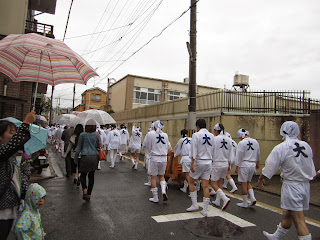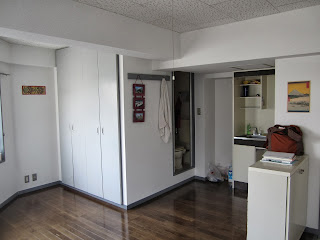The first week of my being in Japan was largely consumed with house hunting after each morning's Japanese class. The whole thing was a lengthy learning process in which I didn't really know what I was doing, yet somehow wound up with a very nice little apartment not far from either of my schools.
To start, people generally don't share rooms our houses with housemates, even as students, in Japan. Similarly, landlords do not market their rooms/houses themselves. Everything is done through reality offices. So, hearing advice to this extent, I identified a reality agency near Ritsumeikan that was recommended by the AU study abroad office. I hunted through their web site for places that looked good, jotted down the names and numbers, and then took my list into the reality agency only three days after landing in Japan.
In hind sight, I fully understand that flicker of a look that said, "oh great, a foreigner," that I saw on my reality agent's face. That said, Imatomi-san was exceedingly patient and helpful with me for the next week. Intending just to set up a time to visit houses later, Imatomi-san took me to the top three choices on my list, and I decided right then and there which place I wanted. The idea was to move in ASAP, but a few things slowed it down.
First, one needs a garunteer, and that person must be in Japan. I did not find out until much too late that Ritsumeikan University has an office that could have done that for me, so I was floundering a bit. A friend from church who is about my mother's age volunteered to help me with apartment things, but as soon as I give her contact info and Chinese name, although she has been living in Japan for almost as long as I have been alive, they would not take her as a garunteer. So I quickly asked the pastor of my church here if he would put his name down for me, assuring him that my Boren Fellowship meant that I would never have to default on payments.
The next crisis was that all of my initial payments needed to be made in cash. While my little apartment is about $300 per month (after DC, that is such a relief!), the initial deposits, key money, and down-payments amounted to more than five times that amount. As one could guess, that is more than my overseas daily withdrawal limit would allow even over the course of a few days.
So, enter phone complications. Almost immediately upon arriving in Japan, I attempted to go get a phone, and was told that there was no way they could sell me a phone plan without me having an address. Meanwhile, the reality agency really wanted me to have a phone number in order to get an apartment. I managed to talk them into letting me use my Chinese friends' phone number as my emergency contact address, because it was clear the phone company wasn't going to budge.
They did send me back one more time once I had decided on a house address, but the bank still wouldn't give me a phone, as it was not registered to me on the back of my foreigner ID card, nor did I have a student ID card yet (and no, that acceptance letter was not a sufficient replacement).
That did mean I had no easy way to contact my bank. Thank goodness for skype calls. That problem fixed, I had the cash, so I was ready to finish signing everything for my apartment. However, when the reality agency asked to see my bank passbook to prove that I had sufficient money still in there, we discovered that American banks don't have passbooks, and that I needed a Japanese bank account in order to sign for the apartment.
At this point I cracked. I found my way to the international student support center at Ritsumeikan and laid out all of my questions and confusions. I discovered that, in order to get a bank account, I needed a national insurance card, which I would need to register my residence for. So, off to the Kyoto Kita-ku ward office I went to register my residence and get national insurance. That took a few hours, but once I was done, I hurried back to the post office bank (the most ubiquitous bank in Japan is the post office) near to school and arrived all of 5 minutes before it closed, to open a bank account. I deposited a bunch of money, logged it on my passbook, then took that to the reality agency, who seemed finally pleased with me.
However, that was not all fast enough. I had to check out of my hostel on Friday morning and was leaving town for the weekend. I would not be able to move in until Monday. My language school was good enough to store two of my big bags for the weekend while I took the other two with me.
Monday came, I rolled off the night bus in the early morning, went to class, and as soon as class was over, I hauled two of my big bags to the reality office. The confused look on Imatomi-san's face told me immediately that I was supposed to have gone straight to my apartment that day myself, but I will blame the language barrier on that one. Fortunately, the office had a car, and he drove me there to meet my landlord, who turned out to be a landlady, much to my surprise. From there, I dropped off my bags and walked the 1.5 miles back to school to grab my last two bags and back.
Japanese rooms are measured by tatami mat size, and mine is a 6-mat one-room apartment. That is, it's about as small as they come and still have their own bathroom and 'kitchen.' I say 'kitchen' because it is really a sink and a single electric burner (which is smarter than me; it only turns on when a non-empty stainless steel pan is on it. I had to ask my landlady to help me figure out how to use it today. While my frying pan makes it mad, thank goodness I got a sauce pan and a tea pot with stainless steel bottoms) with a couple of cabinets. I will have to get myself some more storage and a fridge.
The bathroom is as big as some showers and is all one seamless plastic room with a shower-like door on the outside. There is just one tap, which can be turned from the sink into the tub or triggered to spout out through the shower instead.
As to the rest of the room, it has two large windows, being a corner room, wood floors, a shoe cabinet at the door, and two lovely closets. It was the storage in this place that really made me fall in love with it.
(Sarah models my futon for me)
However, when I first moved in, all I had was a sleeping bag on a bare floor and three suitcases. For better or for worse, my friend Sarah arrived for her visit the very next day after I moved in. Our first job was to find bedding and other housing supplies so we weren't both sleeping on the bare floor. Luckily for us, the department store near my house had a sale on futon mattresses, so we got both layers and walked them back to the apartment. On the way, we stumbled across a tiny neighborhood used furniture store, where we ran back out to get my a little desk and chair for a very reasonable price. The owner even put them in the back of her mini van and drove us the two blocks back to my apartment. I will be going back there for more furniture and appliances later this month, I foresee. The kitchen was mostly furnished by a dollar store. Japanese 100 yen stores have very nice things.
Mid-week, I realized another battle I had to struggle through as a foreigner. I did not know how to throw out my trash. Japan is very particular about sorting trash for burning, recycling, etc, and the lengthy explanation sheet my landlady gave me was a bit hard to read. So, today, I finally had the courage to go down to her office and ask someone to show me how to throw things away. There is one bin for plastic bottles, cans, and glass, one bin for other plastics, and one bin for other burnable garbage (which must be put in a special yellow bag that I need to go find from a local convenience store... I felt pretty stupid throwing my food trash on the curb last Friday with the other yellow bags in my 7-11 bag).
The adventure continues. I am still waiting on orientation next week so I can get my student ID, so I can get a phone, have access to the school computer labs, and get an internet connection of my own here. For now, I am using a very limited free wifi hotspot.
There are still a number of things I still do not understand and still need to do for my house, but this is at least a start.

















